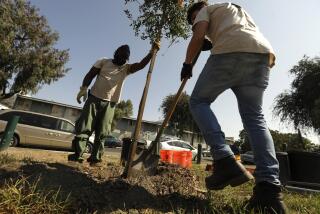Needed: A Third Try at Forestry Reform
- Share via
The latest victims of California’s continuing budgetary crisis may well be its tall trees. Now, it seems, the state’s own forest watchdog agency may not have the money to implement new rules it needs to protect disappearing forests.
Logging practices that undermine the economic viability of the state’s timber industry as well as the recreational and environmental value of California’s forests are in neither the long-term interests of timber companies nor, obviously, of all Californians. Yet those practices continue apace.
California has 7.1 million acres of privately owned timberland. The most recent status report from the Department of Forestry, released in 1988, found that in some parts of the state, including along the North Coast and in Mendocino County, loggers were cutting more trees than they replaced and that the state’s ancient forests--some with trees more than 200 years old--were dwindling rapidly. During the mid-1980s, ancient forests extended over 51,000 acres; about 20,000 acres remain.
The Legislature has tried twice to enact meaningful forestry reform for private timberlands. In 1991, a moderate bill that would have curbed clear-cutting, promoted sustainable timber yields and protected some of the state’s irreplaceable ancient forests reached Gov. Pete Wilson’s desk. Some timber companies vehemently opposed that bill. Others saw these reforms as reasonable and necessary; nonetheless, Wilson vetoed the measure. Mistake one.
Last year, the Legislature balked at a much weaker version of the bill, but one that still had merit--and the governor’s support; that bill never reached Wilson’s desk. Mistake two.
After the first bill died, the forest watchdog agency--Wilson’s own Board of Forestry--imposed tough new rules to protect dwindling forests on an emergency basis. But following a successful court challenge by the timber industry, the board was ordered to lift the rules early this year. It then drafted new, permanent rules--still tougher than existing rules--but now contends that the state can’t cover the additional enforcement costs that those permanent new rules would impose.
Proponents of reform had envisioned these funds coming from a higher yield tax on logging companies, part of the failed legislative packages. The state already charges a yield tax, but these funds are allocated to local government services. Because the higher yield tax proposal died with the bills, the Department of Forestry, which enforces the rules the board adopts, may seek to delay the new rules until January, 1994.
This sorry situation is yet more evidence of the urgent need for a third try at forestry reform when the Legislature reconvenes in January.
More to Read
Sign up for Essential California
The most important California stories and recommendations in your inbox every morning.
You may occasionally receive promotional content from the Los Angeles Times.










